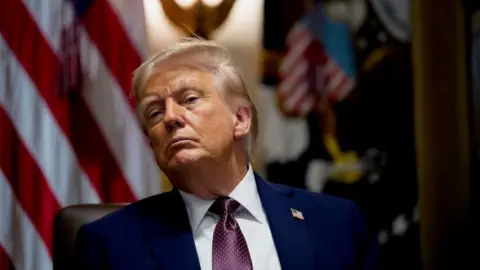In a surprising legal twist, US Attorney General Pam Bondi has ordered the dismissal of charges against Dr. Michael Kirk Moore Jr. The charges included allegations of destroying COVID-19 vaccines valued at $28,000, distributing fraudulent vaccination records, and administering saline shots to children under the pretense of providing vaccines. Attorney General Bondi stated that the decision was made in the interests of justice, suggesting that Dr. Moore had acted out of what he believed was the necessity to offer his patients alternatives when government policies lacked flexibility.
Bondi’s remarks came in response to advocacy from Republican lawmakers, including US Representative Marjorie Taylor Greene and Senator Mike Lee, who characterized the case as a representation of "the weaponization of government." The Attorney General noted on social media that the doctor did not deserve the lengthy prison sentence he faced. This development marks a significant shift from the previous stance of the Biden administration's Justice Department, which had indicted Dr. Moore for multiple offenses, including conspiracy to defraud the government.
Dr. Moore was already on trial in Utah, where he pleaded not guilty to the charges, which encompassed providing false vaccination certificates to over 1,900 individuals in exchange for cash or charity donations. The allegations included misleading parents by infusing children with saline instead of legitimate COVID-19 vaccines, thereby deceiving both guardians and minors regarding their immunizations.
The recent dismissal of charges has sparked discussions among various political and public health circles about the implications for vaccination protocols and personal autonomy in the health care domain. Some proponents, including health advocacy figures like Robert F. Kennedy Jr., have positioned themselves as critics of traditional vaccination practices, contributing to a polarized narrative that surrounds public health policy.
While Dr. Moore's legal battle continues to reverberate through public discourse, the implications of this case reflect broader concerns regarding vaccine integrity and public trust in health responses during a global pandemic. The decision to dismiss charges paints a complex picture of the intersection between legal accountability and medical ethics in the challenging landscape of pandemic-related healthcare practices.
Bondi’s remarks came in response to advocacy from Republican lawmakers, including US Representative Marjorie Taylor Greene and Senator Mike Lee, who characterized the case as a representation of "the weaponization of government." The Attorney General noted on social media that the doctor did not deserve the lengthy prison sentence he faced. This development marks a significant shift from the previous stance of the Biden administration's Justice Department, which had indicted Dr. Moore for multiple offenses, including conspiracy to defraud the government.
Dr. Moore was already on trial in Utah, where he pleaded not guilty to the charges, which encompassed providing false vaccination certificates to over 1,900 individuals in exchange for cash or charity donations. The allegations included misleading parents by infusing children with saline instead of legitimate COVID-19 vaccines, thereby deceiving both guardians and minors regarding their immunizations.
The recent dismissal of charges has sparked discussions among various political and public health circles about the implications for vaccination protocols and personal autonomy in the health care domain. Some proponents, including health advocacy figures like Robert F. Kennedy Jr., have positioned themselves as critics of traditional vaccination practices, contributing to a polarized narrative that surrounds public health policy.
While Dr. Moore's legal battle continues to reverberate through public discourse, the implications of this case reflect broader concerns regarding vaccine integrity and public trust in health responses during a global pandemic. The decision to dismiss charges paints a complex picture of the intersection between legal accountability and medical ethics in the challenging landscape of pandemic-related healthcare practices.



















